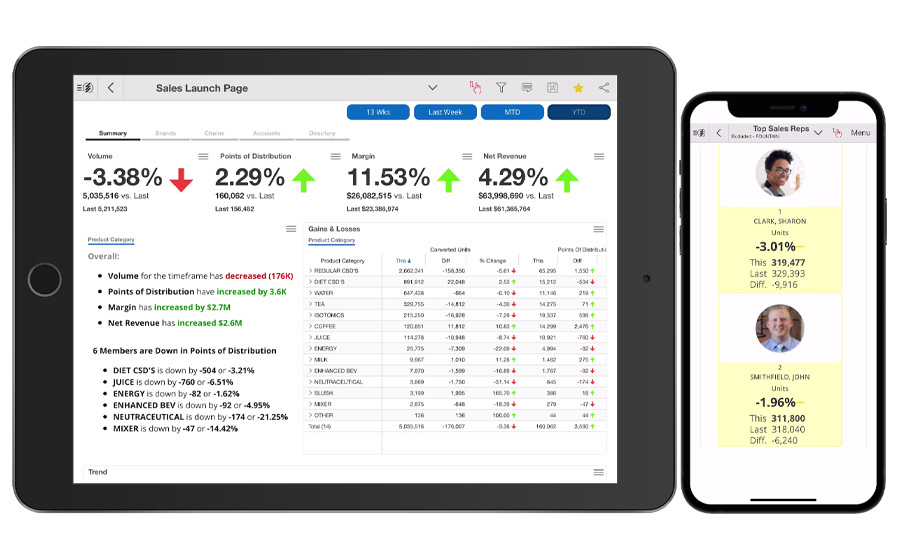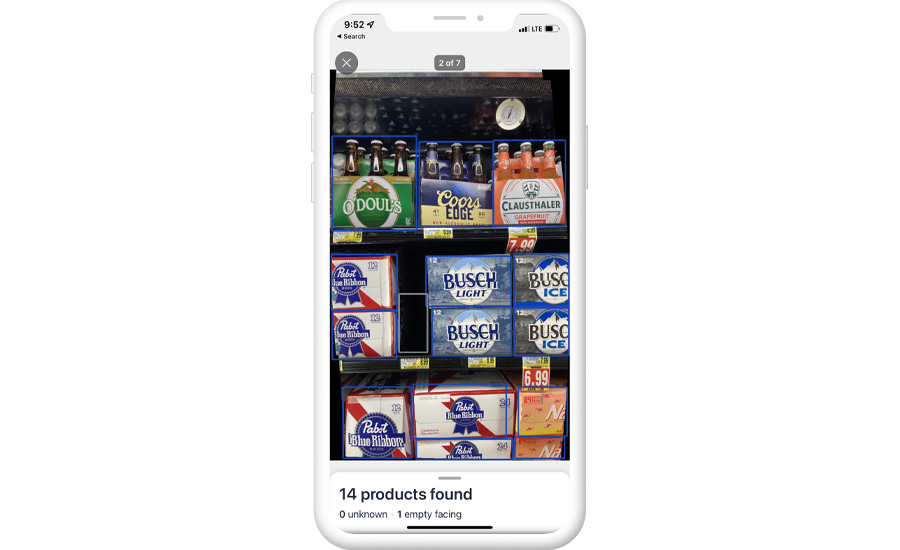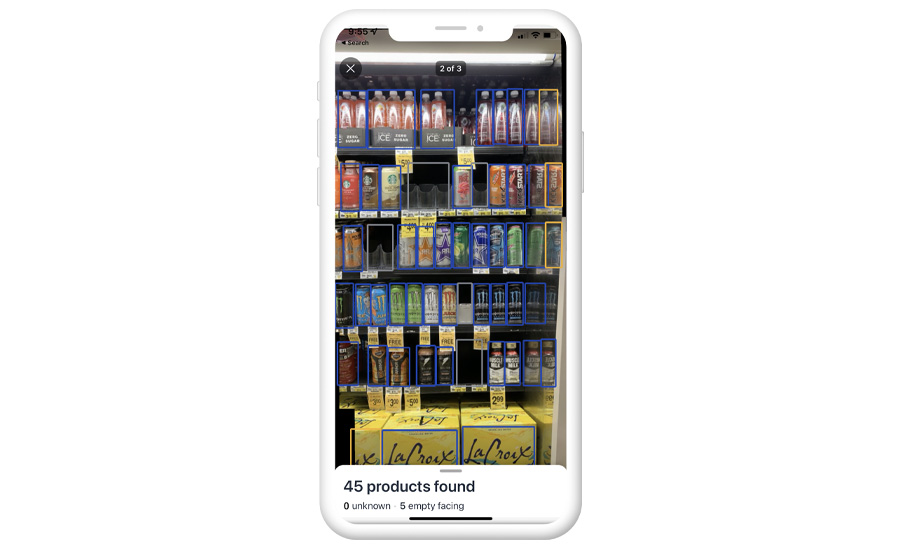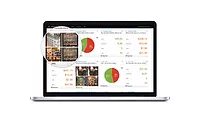Distribution
DSD provides high-tech solutions, improve accuracy and sales
Optimizing efficiency and data key for DSD

Image courtesy of Brother Mobile Solutions
In the Paul McCartney and John Lennon-penned song “Drive my car,” the refrain of the 1965 song proclaims, “Baby, you can drive my car, Yes, I’m gonna be a star, Baby, you can drive my car, And maybe I’ll love you… beep, beep.” In the fast-paced and ever-changing consumer packaged goods (CPG) world, beverage distributors appreciate the “starring roles” that are “driving” the success of direct-store delivery (DSD) handheld technology from the warehouse to retail.
Moving a burgeoning amount of SKUs from point A to point B has only gotten more complicated, but DSD software and hardware solutions ― and the data accuracy they provide ― not only increases product traceability and sales, but provides on-demand simplicity and better customer service.
Paul Stonier, marketing manager for Salient (makers of Margin Minder), Horseheads, N.Y., suggests that wholesalers dealing with SKU proliferation remember two pivotal things: new product introductions and SKU rationalization.

Image courtesy of Salient
“Leading CPG companies look to the Margin Minder solution to understand both. Throughout the lifecycle of a product, managers can see how many customers have repurchased a specific product over time and examine the success of that product launch,” he explains. “Additionally, managers will identify candidates for decommissioning SKUs based on marginal contribution, volume, seasonality, strategic positioning and contractual obligations.”
Salient released a new version of the Margin Minder application that includes a curated set of best practice templates with role-based views, enabling CPG companies to optimize service levels for each customer based on rate-of-sale and prioritize routes accordingly, he adds.
When looking to adopt a DSD solutions, it’s important to ensure the mobile printers selected are up to the rigors of day-to-day route operations, says Brian Beans, route/DSD industry specialist for Brother Mobile Solutions, Westminster, Colo.
“The demands of the job require extreme durability. These printers must be able to withstand bumps and drops and other rugged conditions of route environments. They also must withstand extreme heat and cold,” Beans says. “Another route issue that must be addressed is connectivity. Look for mobile printers that offer easy integration and top connectivity with Wi-Fi, Bluetooth technology, along with must-haves like AirPrint and MFi operations. It’s also critical that the mobile printers selected offer seamless compatibility with major operating systems.”

Image courtesy of Körber Supply Chain Software
Encompass Technologies Sales Executive Cam Koorangi speaks from experience when he notes that the sales rep’s job becomes more difficult with increased wholesaler portfolio depth.
“They have to remember more items each week to educate retailers on,” he explains. “With increased DSD solutions, retailers can now view distributors’ complete product catalogs including new items. They can see brand information, including images, brewery and brand names, and brand descriptions potentially increasing a wholesaler’s exposure to that retailer each time they use a DSD solution.”
With labor shortages and some lingering supply chain challenges from the pandemic, Cory Knopp, vice president of sales for Boston-based FORM MarketX (formerly GoSpotCheck), suggests that DSD mobile solutions in retail delivery and execution are key to labor optimization and increasing market share. The company says its app serves as a digital assistant for frontline teams and is “here for the hustlers.”
“Mobile software that can guide reps, streamline task execution, integrate with other systems of record, and give corporate leaders real-time insights about conditions on the frontline are delivering material advantage to brands and distributors about position, price, assortment, compliance, and competitor activity.”
- Cory Knopp, vice president of sales for FORM MarketX
“Mobile software that can guide reps, streamline task execution, integrate with other systems of record, and give corporate leaders real-time insights about conditions on the frontline are delivering material advantage to brands and distributors about position, price, assortment, compliance, and competitor activity,” Knopp says. “These same flexible solutions can also be used for warehouse and distribution facility operational use cases like environment, health and safety audits.”
Salient’s Stonier agrees: “With the current labor challenges, it’s increasingly important to optimize operational efficiencies across the warehouse to deliveries. By tying picking data with sales and inventory, managers can identify causes for full product loss, hot shots (unscheduled deliveries), and invoice corrections to then be remediated. Additionally, our customers are working to right-size their fleet based on their operational needs.”
Optimizing delivery and data efficiencies
Noting that SKU proliferation within beverages has been a major factor for a decade, Derek Curtis, vice president of sales and supply chain at Minneapolis-based Körber Supply Chain Software, notes that the days of portfolio memorization for SKU numbers, promotions or focus items are long gone.
To help end users struggling with the large volume of data, Curtis points out that today’s DSD software has to proactively drive desirable behaviors. Because the software is able to remember key details about an account, a planogram or customer-targeted promotion, personnel can focus on value-added activities where they can reap the most benefit from their actions, he says.

Image courtesy of FORM MarketX
Optimizing efficiency and data is key for DSD as its software solutions are able to assist distributors in providing actionable insights/data, reducing cost per mile, maximizing productivity and more, says John Wadden, North America product manager at Zebra Technologies.
“Actionable sales trend analysis is extremely powerful information for distributors,” Wadden says. “It enables more accurate planning for internal production capacity and reduces cost per mile by enabling more accurate delivery vehicle sizing and loading. Another benefit for distributors is the ability to map out their route design and determine the appropriate freight loading specifications.”
The Lincolnshire, Ill.-based company offers rugged mobile computing, scanning and printing devices with the ability to deliver real-time operational visibility to maximize distributors’ delivery fleet usage, warehouse packing and driver productivity. They also enable drivers to track deliveries and provide receipts, invoices and proof of delivery documentation to their customers.
“Our newest rugged mobile printers that are ideal for the DSD workplace are the ZQ500 Series and ZQ300 Series,” he says. “They are designed to thrive in tough, outdoor environments featuring extreme temperatures, dust, moisture and drops on concrete.”
In July 2021, FORM acquired the top AI for retail execution, ShelfWise, to massively augment its image recognition capabilities, Knopp says.

Image courtesy of FORM MarketX
“Our customers see a 60%-plus labor optimization on average, a 2% shelf share increase, and a 2 to 5%-plus increase in topline sales through improved positioning and compliance by using our solutions,” he says. “FORM’s solutions also include powerful workflow capabilities to drive risk reduction and improve safety and quality compliance in warehouse and delivery environments.
“We offer industry-leading mobile task management software for field teams, supercharged with AI to reduce store delivery times, and cut store survey times in half,” he continues.
Among the DSD technologies Encompass Technologies offers distributors is online ordering through DSDLink, payment processing through PayLink and Retail Insights including inventory/forecasting.
To stay relevant and keep pace with new innovations, DSD solutions typically need to be upgraded. Encompass Technologies’ Koorangi says its systems have had “a couple of really awesome updates.”
“Retail Insights is our latest and greatest feature that allows wholesalers to drive business growth with live inventory and depletions data flow from retailers,” Koorangi says. “We have also recently upgraded our payment processor Paylink to extend its feature set to allow for ACH, card and check capture options as well as an enhanced UI experience. Lastly, we have a very significant facelift coming to DSDLink, our online ordering platform mid Q2 that will provide for an even better user experience than our customers are used to currently.”
Actionable insights, efficiency gains
Because of the sizable commitment for beverage distributors when leveraging a DSD solution, Körber’s Curtis advises that adoption is necessary to gain efficiencies in operations and drive additional sales. Another big benefit is the technology’s ability to give personnel real-time visibility into field inventory:
- Preventing/limiting stock outs
- Preventing/limiting out of date
- Identifying missing/out of compliance shelf displays
- Driving additional shelf allocation and/or promotional display with real data instead of suggestions
- Improved relationships with retailers by providing verifiable facts rather than impression and intuition driven suggestions
“A quality DSD solution will aid mobile/field teams with information at their fingertips to assure store managers’ requests are addressed, or inventory is moved to a high volume retailer prior to issues becoming problems,” Curtis adds.
Experts suggest that before employing DSD hardware solutions, distributors should consider the environmental conditions in order to select the appropriate handheld device.
“Route delivery is conducted in an environment of high and low temperature extremes along with humidity and dust. Rugged devices that can withstand drops and tumbles are required,” Zebra’s Wadden says. “From a DSD software perspective, the distributor IT group must take into consideration the device operating system lifecycle. Enterprise solutions provide value by ensuring a longer and more consistent lifecycle. This improves operational uptime and enables more manageable and predictable IT support. It provides scalability across the solution distributors ultimately choose and complements their non-route business and production.”
Brother Mobile Solutions’ Beans says the company has seen increased demand for its RuggedJet4, which is mounted on a forklift for labeling pallets and inventory on the spot.
“Trends such as the continued escalation of consumer demand combined with the driver shortage will drive need for automation,” he says. “We expect that the deployment of advanced technologies that support areas such as route optimization, fleet visibility and improved driver retention will be increasingly necessary to provide competitive differentiation for retailers and enable them to stock shelves and quickly turn inventory so they can offer higher levels of consumer satisfaction to drive revenues.”
Driving digital transformation
Another growing trend in delivery are radio-frequency identification (RFID) solutions and their ability to help distributors make more accurate decisions regarding production planning, fleet management and labor resource route planning, experts note.
Meanwhile, Körber provides a device-agnostic, native mobile solution that address all modes of DSD operations, such as presales, sales, delivery, merchandising, and van-sales/peddle sales. Other benefits include GPS tracking, with turn-by-turn directions, real-time actionable analytics, supply chain optimization and multiple warehouse management solutions to address the unique needs of each distributor and its operational size.
“The ultimate goal of each of these solutions is to put the right information in front of the right user at the appropriate time to make decisions that drive value,” Körber’s Knopp says. “We call this proactively driven decisions, and it has been a mantra used in the design of our DSD solutions for decades.”
FORM Marketx’s Knopp suggests that image recognition technology will enable more data capture through photos taken by reps in stores.
“Data collected on the frontline at the intersection of the brand and customer will continue to provide tremendous value to suppliers to inform product [research and development] (R&D), pricing strategies and channel innovation,” he says.
Noting that it’s been more than 20 years since distributers began using electronic data interchange (EDI) to simplify the invoice and paperwork process with retailers, Encompass’ Koorangi says electronic funds transfer (EFT) has further simplified the payment process.
“Over the next few years, we will see companies reallocate their strategic partnerships in an effort to cut costs through automation and reduced man-hours,” Koorangi says. “Platforms that compliment a wholesaler’s existing sales and ordering processes that also give your retailers more options making the entire process more efficient are a no-brainer.
“The future of DSD solution growth will continue to be seen in the eCommerce space specifically around supply chain optimization,” Koorangi concludes. “We will see a continued increase in the adoption of online ordering platforms that incorporate payment solutions. We will also continue to see a heavy focus on inventory/merchandising/forecasting solutions.”
Looking for a reprint of this article?
From high-res PDFs to custom plaques, order your copy today!





